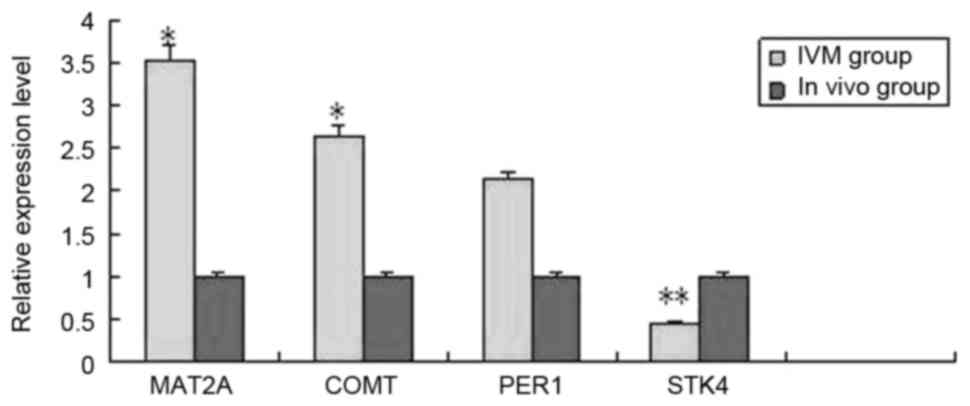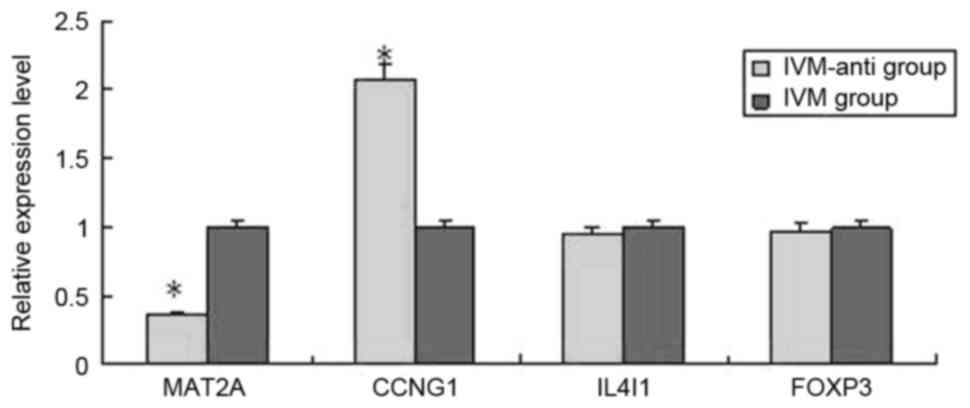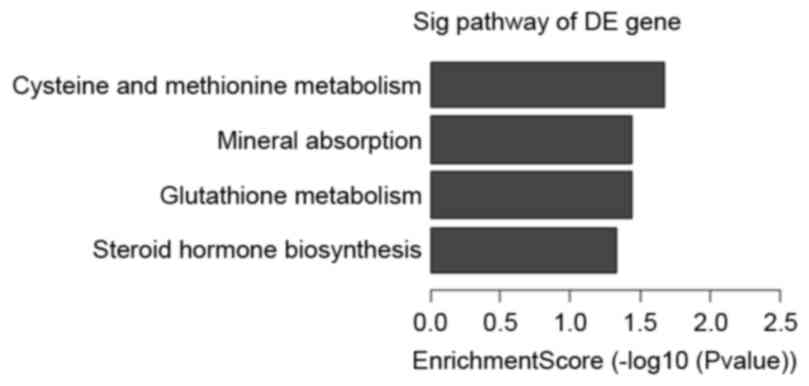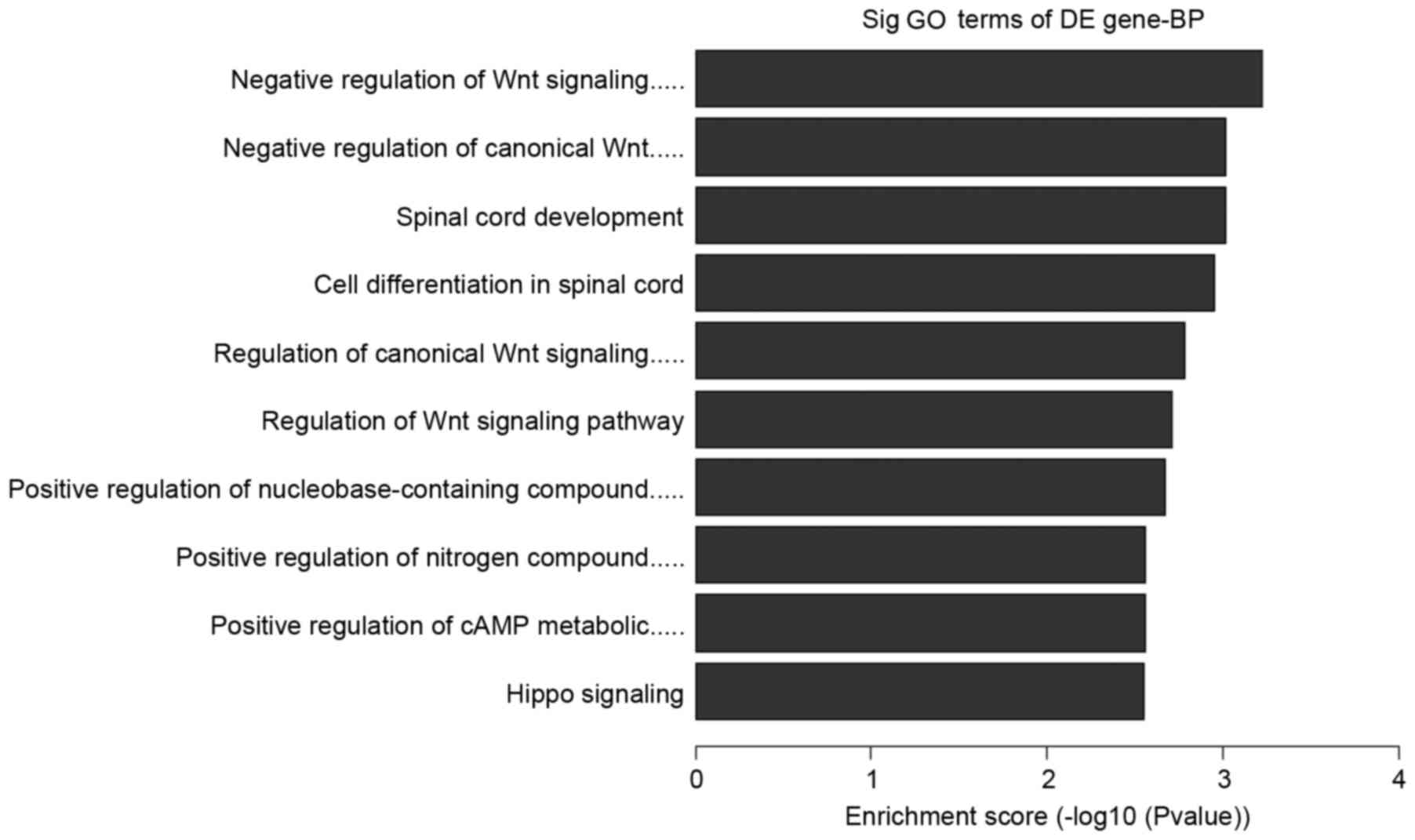|
1
|
Fadini R, Dal Canto MB, Renzini MM,
Brambillasca F, Comi R, Fumagalli D, Lain M and De Ponti E:
Predictive factors in in-vitro maturation in unstimulated women
with normal ovaries. Reprod Biomed Online. 18:251–261. 2009.
View Article : Google Scholar : PubMed/NCBI
|
|
2
|
Smitz JE, Thompson JG and Gilchrist RB:
The promise of in vitro maturation in assisted reproduction and
fertility preservation. Semin Reprod Med. 29:24–37. 2011.
View Article : Google Scholar : PubMed/NCBI
|
|
3
|
Nogueira D, Sadeu JC and Montagut J: In
vitro oocyte maturation: Current status. Semin Reprod Med.
30:199–213. 2012. View Article : Google Scholar : PubMed/NCBI
|
|
4
|
Harvey AJ, Kind KL and Thompson JG: REDOX
regulation of early embryo development. Reproduction. 123:479–486.
2002. View Article : Google Scholar : PubMed/NCBI
|
|
5
|
Reshi ML, Su YC and Hong JR: RNA viruses:
ROS-mediated cell death. Int J Cell Bio. 2014:4674522014.
|
|
6
|
Li Y, Zhang Z, He C, Zhu K, Xu Z, Ma T,
Tao J and Liu G: Melatonin protects porcine oocyte in vitro
maturation from heat stress. J Pineal Res. 59:365–375. 2015.
View Article : Google Scholar : PubMed/NCBI
|
|
7
|
Mukherjee D, Roy SG, Bandyopadhyay A,
Chattopadhyay A, Basu A, Mitra E, Ghosh AK, Reiter RJ and
Bandyopadhyay D: Melatonin protects against isoproterenol-induced
myocardial injury in the rat: Antioxidative mechanisms. J Pineal
Res. 48:251–262. 2010. View Article : Google Scholar : PubMed/NCBI
|
|
8
|
Takasaki A, Nakamura Y, Tamura H,
Shimamure K and Morioka H: Melatonin as a new drug for improving
oocyte quality. Reprod Med Biol. 2:139–144. 2003. View Article : Google Scholar
|
|
9
|
Cruz MH, Leal CL, da Cruz JF, Tan DX and
Reiter RJ: Role of melatonin on production and preservation of
gametes and embryos: A brief review. Anim Reprod Sci. 145:150–160.
2014. View Article : Google Scholar : PubMed/NCBI
|
|
10
|
Kim MK, Park EA, Kim HJ, Choi WY, Cho JH,
Lee WS, Cha KY, Kim YS, Lee DR and Yoon TK: Does supplementation of
in-vitro culture medium with melatonin improve IVF outcome in PCOS?
Reprod Biomed Online. 26:22–29. 2013. View Article : Google Scholar : PubMed/NCBI
|
|
11
|
Carr R, Wasdell MB, Hamilton D, Weiss MD,
Freeman RD, Tai J, Rietveld WJ and Jan JE: Long-term effectiveness
outcome of melatonin therapy in children with treatment-resistant
circadian rhythm sleep disorders. J Pineal Res. 43:351–359. 2007.
View Article : Google Scholar : PubMed/NCBI
|
|
12
|
Li W, Cheng K, Zhang Y, Meng Q, Zhu S and
Zhou G: No effect of exogenous melatonin on development of
cryopreserved metaphase II oocytes in mouse. J Anim Sci Biotechnol.
6:422015. View Article : Google Scholar : PubMed/NCBI
|
|
13
|
Isachenko EF and Nayudu PL: Vitrification
of mouse germinal vesicle oocytes: Effect of treatment temperature
and egg yolk on chromosomal normality and cumulus integrity. Hum
Reprod. 14:400–408. 1999. View Article : Google Scholar : PubMed/NCBI
|
|
14
|
Mandelbaum J, Belaїsch-Allart J, Junca AM,
Antoine JM, Plachot M, Alvarez S, Alnot MO and Salat-Baroux J:
Cryopreservation in human assisted reproduction is now routine for
embryos but remains a research procedure for oocytes. Hum Reprod.
13:161–177. 1998. View Article : Google Scholar : PubMed/NCBI
|
|
15
|
Li Y, Yang D and Zhang Q: Clinical outcome
of one-third-dose depot triptorelin is the same as half-dose depot
triptorelin in the long protocol of controlled ovarian stimulation.
J Hum Reprod Sci. 5:14–19. 2012. View Article : Google Scholar : PubMed/NCBI
|
|
16
|
Gardner DK, Lane M, Stevens J, Schlenker T
and Schoolcraft WB: Blastocyst score affects implantation and
pregnancy outcome: Towards a single blastocyst transfer. Fertil
Steril. 73:1155–1158. 2000. View Article : Google Scholar : PubMed/NCBI
|
|
17
|
R Development Core Team R, . A language
and Environment for Statistical Computing. R Foundation for
Statistical Computing; Vienna: 2008
|
|
18
|
Livak KJ and Schmittgen TD: Analysis of
relative gene expression data using real-time quantitative PCR and
the 2(−Delta Delta C(T)) method. Methods. 25:402–408. 2001.
View Article : Google Scholar : PubMed/NCBI
|
|
19
|
Tamura H, Takasaki A, Taketani T, Tanabe
M, Kizuka F, Lee L, Tamura I, Maekawa R, Aasada H, Yamagata Y and
Sugino N: The role of melatonin as an antioxidant in the follicle.
J Ovarian Res. 5:52012. View Article : Google Scholar : PubMed/NCBI
|
|
20
|
Tian X, Wang F, He C, Zhang L, Tan D,
Reiter RJ, Xu J, Ji P and Liu G: Beneficial effects of melatonin on
bovine oocytes maturation: A mechanistic approach. J Pineal Res.
57:239–247. 2014. View Article : Google Scholar : PubMed/NCBI
|
|
21
|
Büyükavci M, Ozdemir O, Buck S, Stout M,
Ravindranath Y and Savaşan S: Melatonin cytotoxicity in human
leukemia cells: Relation with its pro-oxidant effect. Fundam Clin
Pharmacol. 20:73–79. 2006. View Article : Google Scholar : PubMed/NCBI
|
|
22
|
Unfer V, Raffone E, Rizzo P and Buffo S:
Effect of a supplementation with myo-inositol plus melatonin on
oocyte quality in women who failed to conceive in previous in vitro
fertilization cycles for poor oocyte quality: A prospective,
longitudinal, cohort study. Gynecol Endocrino. 27:857–861. 2011.
View Article : Google Scholar
|
|
23
|
Batıoğlu AS, Sahin U, Gürlek B, Oztürk N
and Unsal E: The efficacy of melatonin administration on oocyte
quality. Gynecol Endocrinol. 28:91–93. 2012. View Article : Google Scholar : PubMed/NCBI
|
|
24
|
Rodriguez-Osorio N, Kim IJ, Wang H, Kaya A
and Memili E: Melatonin increases cleavage rate of porcine
preimplantation embryos in vitro. J Pineal Res. 43:283–288. 2007.
View Article : Google Scholar : PubMed/NCBI
|
|
25
|
Sakaguchi K, Itoh MT, Takahashi N, Tarumi
W and Ishizuka B: The rat oocyte synthesises melatonin. Reprod
Fertil Dev. 25:674–682. 2013. View Article : Google Scholar : PubMed/NCBI
|
|
26
|
Gao C, Han HB, Tian XZ, Tan DX, Wang L,
Zhou GB, Zhu SE and Liu GS: Melatonin promotes embryonic
development and reduces reactive oxygen species in vitrified mouse
2-cell embryos. J Pineal Res. 52:305–311. 2012. View Article : Google Scholar : PubMed/NCBI
|
|
27
|
Wynn P, Picton HM, Krapez JA, Rutherford
AJ, Balen AH and Gosden RG: Pretreatment with follicle stimulating
hormone promotes the numbers of human oocytes reaching metaphase II
by in vitro maturation. Hum Reprod. 13:3132–3138. 1998. View Article : Google Scholar : PubMed/NCBI
|
|
28
|
Chiba H, Hiura H, Okae H, Miyauchi N, Sato
F, Sato A and Arima T: DNA methylation errors in imprinting
disorders and assisted reproductive technology. Pediatr Int.
55:542–549. 2013. View Article : Google Scholar : PubMed/NCBI
|
|
29
|
Song S, Ghosh J, Mainigi M, Turan N,
Weinerman R, Truongcao M, Coutifaris C and Sapienza C: DNA
methylation differences between in vitro- and in vivo-conceived
children are associated with ART procedures rather than
infertility. Clin Epigenetics. 7:412015. View Article : Google Scholar : PubMed/NCBI
|
|
30
|
Maher ER, Afnan M and Barratt CL:
Epigenetic risks related to assisted reproductive technologies:
Epigenetics, imprinting, ART and icebergs? Hum Reprod.
18:2508–2511. 2003. View Article : Google Scholar : PubMed/NCBI
|
|
31
|
Kuhtz J, Romero S, de Vos M, Smitz J, Haaf
T and Anckaert E: Human in vitro oocyte maturation is not
associated with increased imprinting error rates at LIT1, SNRPN,
PEG3 and GTL2. Hum Reprod. 29:1995–2005. 2014. View Article : Google Scholar : PubMed/NCBI
|
|
32
|
Pliushch G, Schneider E, Schneider T, El
Hajj N, Rösner S, Strowitzki T and Haaf T: In vitro maturation of
oocytes is not associated with altered deoxyribonucleic acid
methylation patterns in children from in vitro fertilization or
intracytoplasmic sperm injection. Fertil Steril. 103:720–727.e1.
2015. View Article : Google Scholar : PubMed/NCBI
|
|
33
|
Schwimmer H, Metzer A, Pilosof Y, Szyf M,
Machnes ZM, Fares F, Harel O and Haim A: Light at night and
melatonin have opposite effects on breast cancer tumors in mice
assessed by growth rates and global DNA methylation. Chronobiol
Int. 31:144–150. 2014. View Article : Google Scholar : PubMed/NCBI
|
|
34
|
Lee SE, Kim SJ, Yoon HJ, Yu SY, Yang H,
Jeong SI, Hwang SY, Park CS and Park YS: Genome-wide profiling in
melatonin-exposed human breast cancer cell lines identifies
differentially methylated genes involved in the anticancer effect
of melatonin. J Pineal Res. 54:80–88. 2013. View Article : Google Scholar : PubMed/NCBI
|
|
35
|
Korkmaz A and Reiter RJ: Epigenetic
regulation: A new research area for melatonin? J Pineal Res.
44:41–44. 2008.PubMed/NCBI
|
|
36
|
Woods DB and Vousden KH: Regulation of p53
function. Exp Cell Res. 264:56–66. 2001. View Article : Google Scholar : PubMed/NCBI
|
|
37
|
Appella E and Anderson CW:
Post-translational modifications and activation of p53 by genotoxic
stresses. Eur J Biochem. 268:2764–2772. 2001. View Article : Google Scholar : PubMed/NCBI
|
|
38
|
Stegh AH: Targeting the p53 signaling
pathway in cancer therapy-the promises, challenges and perils.
Expert Opin Ther Targets. 16:67–83. 2012. View Article : Google Scholar : PubMed/NCBI
|
|
39
|
Levine AJ, Hu W and Feng Z: The P53
pathway: What questions remain to be explored? Cell Death Differ.
13:1027–1036. 2006. View Article : Google Scholar : PubMed/NCBI
|
|
40
|
Chen D, Zheng W, Lin A, Uyhazi K, Zhao H
and Lin H: Pumilio 1 suppresses multiple activators of p53 to
safeguard spermatogenesis. Curr Biol. 22:420–425. 2012. View Article : Google Scholar : PubMed/NCBI
|
|
41
|
Petersen CP and Reddien PW: Wnt signaling
and the polarity of the primary body axis. Cell. 139:1056–1068.
2009. View Article : Google Scholar : PubMed/NCBI
|
|
42
|
Nusse R and Varmus HE: Wnt genes. Cell.
69:1073–1087. 1992. View Article : Google Scholar : PubMed/NCBI
|
|
43
|
Lin T, Mak NK and Yang MS: MAPK regulate
p53-dependent cell death induced by benzo(a)pyrene: Involvement of
p53 phosphorylation and acetylation. Toxicology. 247:145–153. 2008.
View Article : Google Scholar : PubMed/NCBI
|
|
44
|
Kim NH, Kim HS, Kim NG, Lee I, Choi HS, Li
XY, Kang SE, Cha SY, Ryu JK, Na JM, et al: p53 and miRNA-34 are
suppressors of canonical Wnt signaling. Sci Signal. 4:ra712012.
|
|
45
|
Revel A, Achache H, Stevens J, Smith Y and
Reich R: MicroRNAs are associated with human embryo implantation
defects. Hum Reprod. 26:2830–2840. 2011. View Article : Google Scholar : PubMed/NCBI
|
|
46
|
Lee SE, Kim SJ, Youn JP, Hwang SY, Park CS
and Park YS: MicroRNA and gene expression analysis of
melatonin-exposed human breast cancer cell lines indicating
involvement of the anticancer effect. J Pineal Res. 51:345–352.
2011. View Article : Google Scholar : PubMed/NCBI
|



















